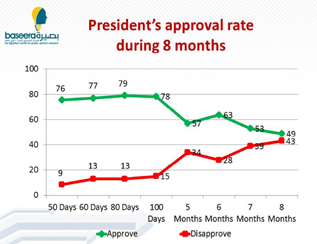CAIRO: During the month of July, Egypt’s Suez Canal posted the highest monthly revenue since the global financial crisis in late 2008, totaling $406.2 million.
The latest figure is up 6.1 percent from $382.9 million in July 2009 and a 5.9 percent rise over $383.7 million in June.
According to a statement by the Suez Canal Authority (SCA), vessel traffic in the channel increased by 2.2 percent reaching 1,554 vessels compared to 1,521 ships in July 2009. Cargo ships also increased by 10.8 percent and tonnage amounted to 71.9 million tons, compared to 64.9 million tons in July 2009.
During the first seven months of 2010, revenues were up 11.5 percent over the same period in 2009, reaching $2.66 billion compared to $2.38 billion.
Trade goods transported through the canal increased 18.8 percent registering 369 million tons this year, compared with 310.7 million tons in the same period in 2009. Transit traffic increased as well, by 3.1 percent as 10,205 passed through the canal ships in the first seven months of 2010 compared to 9,896 vessels in the same period last year.
“All of these indicators are good signs of a global economic recovery and improvements in the movement and abundance of world trade passing through the canal,” said Tarek Hassanien, a spokesman for the SCA.
The Economist Intelligence Unit’s “Egypt Country Report” for August stated that revenues would increase in the upcoming financial year. “Having dipped markedly in 2009/10, revenue growth should pick up as global trade, and thus earnings from the Suez Canal and customs duties, recovers,” the report said.
Jennifer Bremer, chair of the public policy and administration department at the American University in Cairo, said that traditional sources of revenue such as the Suez Canal, have recovered considerably, helping the government avoid further borrowing and control the increase in government debt.
“Holding down public debt is absolutely critical for controlling inflation, especially given that other sources of inflation, particularly ‘imported’ inflation caused by unstable global commodity prices, are really out of the government’s control,” she added.
On Aug. 5, the canal witnessed the passing of the largest cargo vessel in its history after the completion of a project deepening the channel to allow larger vessels to cross.
The bulk vessel, the ELEFTHERIA K carrying a cargo of iron ore coming from Ukraine on its way to China, carried 211 tons with a hull depth of 65.1 feet. It paid $362,000 in fees to pass.
“What was achieved during the last few months is evidence of the success of management in the development of the Egyptian Suez Canal to cope with the steady increase in fleet sizes and loads coming through from around the world,” said Hassanien.
“Trade between east and west is increasing and it all passes through here, so the canal acts as a barometer of international trade,” he added.
“New improvements, like increasing the canals depth, are all a part of a comprehensive plan to increase the number of vessels going through the canal and therefore increase revenues,” he concluded.

